|
|
|
Sort Order |
|
|
|
Items / Page
|
|
|
|
|
|
|
| Srl | Item |
| 1 |
ID:
178021


|
|
|
|
|
| Summary/Abstract |
The U.S. government increasingly outsources important national security responsibilities to defense contractors. In addition to manufacturing hardware and weapons, corporations now supply much of the specialized labor used by American defense and intelligence agencies to execute cyber operations, train foreign militaries, analyze top-secret information, and pilot unmanned aerial vehicles. This study examines the current state of affairs in the U.S. defense industry and demonstrates that publicly traded corporations are awarded the lion’s share of U.S. contracting dollars spent on national defense. Subsequently, the inquiry argues that publicly traded corporations possess a competitive advantage over privately held companies in the U.S. defense industry because of their superior ability to raise capital through initial public offerings, follow-on share sales, and access to debt supplied by financial institutions. In recent years, publicly traded defense contractors have used these financial strategies to make major acquisitions, increase their competitiveness, and consolidate market share in the American defense industry.
|
|
|
|
|
|
|
|
|
|
|
|
|
|
|
|
| 2 |
ID:
193065


|
|
|
|
|
| Summary/Abstract |
The two decades of war in Afghanistan left a mark on the American armed forces and redefined the American ways of war-making. One of this war’s legacies is the reimagining of the role of private military and security contractors in contemporary warfare. Due to the massive involvement of the private sector in the American war machine, this industry transformed from a marginal participant into a central partner. The privatization of military and security functions became a norm, an integral part of security architecture and military operation. In this study, I provide a brief review of this development and its implications.
|
|
|
|
|
|
|
|
|
|
|
|
|
|
|
|
| 3 |
ID:
117619
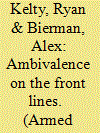

|
|
|
|
|
| Publication |
2013.
|
| Summary/Abstract |
In the past several decades, the US military has increasingly relied on civilian contractors to provide a variety of core functions. Lagging behind this increased reliance on contractors is an understanding of how the presence of contractors influences civilian and military personnel. This research addresses this question using a unique study of US Department of Army civilians and military personnel serving in Iraq and Afghanistan. We find a substantial degree of ambivalence among both groups regarding the impact of contractors on the military and comparisons with contractors, but we also find a noticeable trend of comparative discontent beneath this apparent ambivalence. Results are discussed in the context of using ambivalence as a starting point for building a theoretical approach to more systematically understanding the role and effects of contractor integration in the military.
|
|
|
|
|
|
|
|
|
|
|
|
|
|
|
|
| 4 |
ID:
100119


|
|
|
| 5 |
ID:
124989
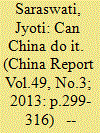

|
|
|
|
|
| Publication |
2013.
|
| Summary/Abstract |
Since the turn of the century the Chinese state has endeavoured to establish an internationally competitive, export-oriented software services industry centred on large domestic firms. However, despite concerted targeting and significant state investment, the industry's size and capabilities have fallen further behind those in peer competitor countries, particularly India. The article assesses the progress of the industry in China and examines how this relates to the PRC's software strategy. It does so by adopting a comparative analysis approach, evaluating the PRC's policy agenda and the axioms underpinning it in light of emerging research on the processes and mechanisms behind the more successful development of the software services industry in India. The article concludes by arguing that the PRC needs to make several substantive changes to its software strategy if it is to achieve its objectives
|
|
|
|
|
|
|
|
|
|
|
|
|
|
|
|
| 6 |
ID:
080874
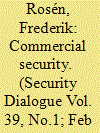

|
|
|
|
|
| Publication |
2008.
|
| Summary/Abstract |
Today, in what has been described as a re-emergence of privately organized extraterritorial force, the private military and security industry supplies the major military powers with a range of core services. This article asks how such a development came about, and why it has become politically uncomplicated to outsource such intimate state functions as the executive branches of foreign policy programmes. How did certain states arrive at a situation where it is unclear whether core military and security affairs are run by public or private agencies? The article answers these questions by presenting and commenting on general explanations as to why the private military industry has grown so much in post-invasion Iraq. It adds new perspectives to existing scholarly work by suggesting that the reappearance of private extraterritorial force could not have occurred on such a scale without a restructuring of neutrality in international relations. It is suggested that this change in neutrality might constitute the sine qua non of the re-emergence of private extraterritorial force.
|
|
|
|
|
|
|
|
|
|
|
|
|
|
|
|
| 7 |
ID:
095039


|
|
|
|
|
| Publication |
2010.
|
| Summary/Abstract |
The UK defence economy has some distinctive features. Its Armed Forces have a worldwide capability reflected in modern air, land and sea forces with an expeditionary role. Its world role is further reflected in a nuclear capability and a high technology defence industrial base, substantial defence R&D with the UK as a major arms exporter. This survey focuses on the period 1970 to 2008. It explains the military-industrial complex and estimates a demand for military expenditure function. There follows an analysis of procurement and defence industrial policy. Future policy issues are outlined, namely, the costs of the UK's world role and its relations with European defence policy. It is concluded that the UK faces some difficult defence choices.
|
|
|
|
|
|
|
|
|
|
|
|
|
|
|
|
| 8 |
ID:
190834


|
|
|
|
|
| Summary/Abstract |
How does the price of energy affect the extent of production fragmentation in India’s manufacturing industries? The prevailing literature has engaged with production fragmentation and trade in middle products for a long time, but the relationship between energy prices and production fragmentation is less understood. This article deals with firm-level panel data of India’s manufacturing industries between 2005 and 2018 to estimate the impact of rising energy prices on the outsourcing decisions/production organization of the manufacturing firms. The article also uses a number of covariates, including wages, welfare expenses, sales, profit after tax, dividend rate, foreign exchange earnings and an interaction term between energy prices and foreign exchange earnings. The empirical results of this article indicate that larger firms tend to outsource production in part to smaller firms in order to cope with rising energy prices and keep their profitability intact. Static and dynamic panel estimates with a variety of robustness analyses support the main conjectures.
|
|
|
|
|
|
|
|
|
|
|
|
|
|
|
|
| 9 |
ID:
077670


|
|
|
|
|
| Publication |
2007.
|
| Summary/Abstract |
The failure of Japanese electronics firms to participate fully in the Internet-fueled growth of the global electronics industry during the late 1990s triggered a period of questioning among top executives. This article examines Japanese managerial responses to the organizational model "value chain modularity," which was deployed by the US electronics firms driving the creation of the Internet. While there were partial but significant steps taken in the direction of this new US model-increased specialization, outsourcing of low-end products, and shared factory investments in Japan -wholesale restructuring was resisted. This evidence is consistent with larger patterns of gradual institutional change in Japan . I argue that the result of this process will likely be increased, not diminished, institutional diversity over time. While globalization has accelerated the pace of change by opening new avenues for organizational experimentation and institutional layering, the drag on organizational change exerted by existing institutions slows the process enough to allow institutional and organizational innovations to develop into coherent systems with distinct characteristics. The result, inevitably, will be a uniquely Japanese approach to the challenges posed by globalization.
|
|
|
|
|
|
|
|
|
|
|
|
|
|
|
|
| 10 |
ID:
101100
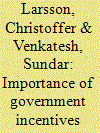

|
|
|
|
|
| Publication |
2010.
|
| Summary/Abstract |
Studies on industrial clustering identify factors that nourish the clustering and thus aid in industrial development. We classify these as government incentives and economic fundamentals. Economic fundamentals, which we define as a set of essential factors conducive to the development of an industry cluster, may be the result of chance - for instance, geographical location and climate or may be a result of long term government policies such as affordable and abundant higher education. We examine the importance of government incentives relative to the economic fundamentals in the development of the software services industry in Thailand. Our survey of investors, both foreign and domestic, in the software services industry in Thailand, found that economic fundamentals were perceived as being more important than government incentives in influencing investment decisions. This raises important questions for government policy. For example, is money used for tax breaksand grants efficiently spent? Or, could the money be better invested in improving the quality of human resources and infrastructure? Based on the findings of this study, recommendations are proposed for government policy and directions for future research.
|
|
|
|
|
|
|
|
|
|
|
|
|
|
|
|
| 11 |
ID:
161918
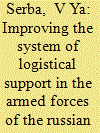

|
|
|
|
|
| Summary/Abstract |
This paper examines the current state of logistic support in the RF Armed Forces, highlighting the problems that plague this system, and offers likely ways of solving theme for individual kinds of logistical support.
|
|
|
|
|
|
|
|
|
|
|
|
|
|
|
|
| 12 |
ID:
173299
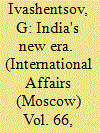

|
|
|
|
|
| Summary/Abstract |
INDIA is invariably mentioned among new major international actors. This is logical. Populated by 1.38 billion people, India is the world's second-largest country in terms of population. Its economy grew by a factor of 3.3 between 2000 and 2017 and, with its gross domestic product accounting for 7.4% of global GDP in terms of purchasing power parity, became the world's third-largest economy in 2017 after the economies of the United States and China. India's armed forces are the world's fourth-most powerful military after those of the United States, Russia and China. India possesses nuclear weapons and runs a space program comparable to those of the European Union, China and Japan. India holds a key geostrategic position along with increasingly powerful China, the oil- and natural gas-producing Middle East, and Africa with its growing economies. India also controls key shipping routes in the Indian Ocean.
|
|
|
|
|
|
|
|
|
|
|
|
|
|
|
|
| 13 |
ID:
095595


|
|
|
|
|
| Publication |
2010.
|
| Summary/Abstract |
Industry outsourcing has become a significant feature of industrialisation in Southeast Asia. This study presents the findings of a study of smaller industrial enterprises in Northeast Thailand that outsource some of their operations to workers in rural villages. It was found that social relationships rather than formal contracts are critical in the management and spread of such outsourcing and that industries use outsourcing primarily as a flexible strategy to lower costs of production.
|
|
|
|
|
|
|
|
|
|
|
|
|
|
|
|
| 14 |
ID:
160361


|
|
|
|
|
| Summary/Abstract |
Corporatisation of critical information infrastructure (CII) is rooted in the ‘privatisation wave’ of the 1980s-90s, when the ground was laid for outsourcing public utilities. Despite well-known risks relating to reliability, resilience, and accountability, commitment to efficiency imperatives have driven governments to outsource key public services and infrastructures. A recent illustrative case with enormous implications is the 2017 Swedish ICT scandal, where outsourcing of CII caused major security breaches. With the transfer of the Swedish Transport Agency’s ICT system to IBM and subcontractors, classified data and protected identities were made accessible to non-vetted foreign private employees – sensitive data could thus now be in anyone’s hands. This case clearly demonstrates accountability gaps that can arise in public-private governance of CII.
|
|
|
|
|
|
|
|
|
|
|
|
|
|
|
|
| 15 |
ID:
167153
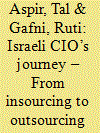

|
|
|
|
|
| Summary/Abstract |
One of the difficult decisions that a Chief of Information Manager takes is whether to use organisational resources or to contract suppliers, in order to perform information technology (IT) projects. Over the last decade, managers in Israel have moved from insourcing to outsourcing due to different reasons, mainly to reduce costs and focus on their core business. In the last two years, they started to return IT projects, services, and activities back, using new source models. This study examines the tendency of the Israeli IT managers in sourcing decisions in order to understand the problems, application and suitability of various kinds of models.
|
|
|
|
|
|
|
|
|
|
|
|
|
|
|
|
| 16 |
ID:
106434


|
|
|
|
|
| Publication |
2011.
|
| Summary/Abstract |
An increase in the use of private military and security contractors over the last two decades has sparked a debate over whether their employment enhances or detracts from government control of its security agents. Although there is a rich literature on civilian control of military agents, there is still disagreement on the operationalization of control, and there has been little attempt to apply these theories to private actors. This article contributes to both discussions by offering a synthesis of theories of control and comparing features specific to public versus private agents that may affect control. The author offers the hypothesis that the principles of democratic governance are likely to be more secure when policy is carried out by public agents.
|
|
|
|
|
|
|
|
|
|
|
|
|
|
|
|
| 17 |
ID:
102774
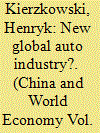

|
|
|
|
|
| Publication |
2011.
|
| Summary/Abstract |
This paper brings together a number of robust trade models to shed some light on the likely evolution of the global automotive industry. Vertical product differentiation, intra-industry trade and fragmentation of production leading to international outsourcing are important features of the existing global automotive sector. The global automotive sector will most likely experience groundbreaking changes over the coming decades. The sector is confronted with a multidimensional technological revolution spurred by radical product innovation, shifts in customer demand and government incentives. A dominant driver will be growing public concern about climate change. China and India might well become leading players by 2050, if not earlier.
|
|
|
|
|
|
|
|
|
|
|
|
|
|
|
|
| 18 |
ID:
060594


|
|
|
| 19 |
ID:
193187
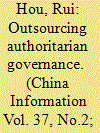

|
|
|
|
|
| Summary/Abstract |
How does privatization impact authoritarian governance on the frontline? This article examines the impact of outsourcing on the labour process involved in the operation of mayors’ hotlines. The mayor’s hotline system is a channel set up by Chinese municipal governments to address residents’ suggestions, appeals, inquiries, and complaints. While the expansion of mayors’ hotlines falls under the government in China, the operation of call centres has been outsourced to professional tele-corporations; thus, it is for-profit companies and their employees that represent the state in communications with the public. By examining both the practical and relational components of call operators’ labour process, this article looks at how an institution of responsive authoritarianism has been contracted out in China. It argues that the outsourcing creates a dual-pressure structure that shapes the frontline governance of this institution. The engagement of privatization in authoritarian domination leads to a conflict between market rationality and the inherited tradition of state intervention.
|
|
|
|
|
|
|
|
|
|
|
|
|
|
|
|
| 20 |
ID:
140356
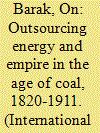

|
|
|
|
|
| Summary/Abstract |
During the long 19th century, British coal proliferated throughout the Ottoman Empire in increasing quantity, rapidity, and regularity via junctions and political arrangements that became evermore stable and dominant. The British used coal export to project their power elsewhere, offshoring the Industrial Revolution by building an infrastructure that could support it overseas and connect it to existing facets of the imperial project. Examining this “outsourcing” and the importance of foreign coal markets to industrialization helps provincialize the steam engine and anchor it in a global context. It also allows us to explore the impact of fossil energy on the Middle East and the ways coal both set the stage for the arrival of oil and informed the possibilities for translating carbon power into politics. Coal, the article suggests, animated political participation in England while reinforcing authoritarian tendencies in the Middle East.
|
|
|
|
|
|
|
|
|
|
|
|
|
|
|
|
|
|
|
|
|